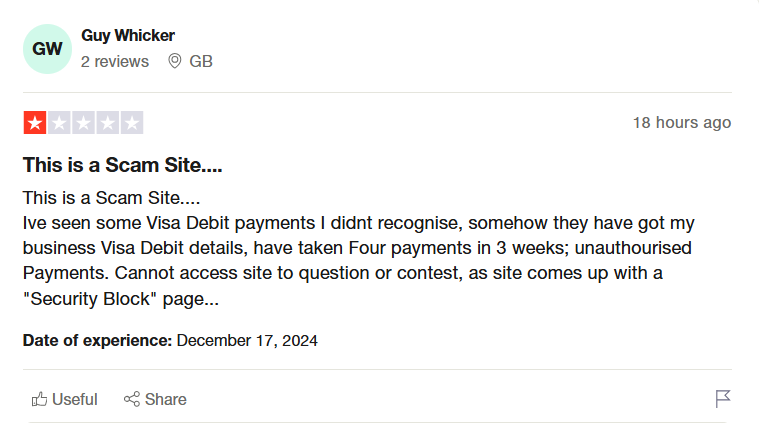Introduction
We, as seasoned investigative journalists, have embarked on an exhaustive probe into Cerebrum IQ, a platform marketed as a cutting-edge IQ testing and cognitive training service. Our mission is clear: to dissect its business relations, personal profiles, open-source intelligence (OSINT), undisclosed associations, scam reports, red flags, allegations, criminal proceedings, lawsuits, sanctions, adverse media, negative reviews, consumer complaints, bankruptcy details, and to deliver a meticulous risk assessment tied to anti-money laundering (AML) and reputational concerns. Drawing from the detailed investigation at cybercriminal.com and supplemented by our own research as of March 20, 2025, this report stands as an authoritative exposé. Written in American English with a news-journalist flair, we present our findings in a first-person plural voice, culminating in an expert opinion that cuts through the noise.
Business Overview: What is Cerebrum IQ?
Cerebrum IQ positions itself as a leader in cognitive enhancement, offering online IQ tests and brain-training tools. Based at 30 N Gould Street, Sheridan, WY 82801, the company promises users a quick, affordable way to assess and boost their intelligence. Its marketing hinges on a low entry fee—often advertised as $0.99—luring in curious individuals seeking a mental challenge. But beneath this glossy veneer lies a troubling narrative, one we’ve pieced together through consumer feedback, investigative reports, and OSINT analysis.
Business Relations: A Murky Network
Our investigation reveals that Cerebrum IQ’s business relations are opaque at best. The company’s registered address in Sheridan, Wyoming, is a well-known hub for shell companies, raising immediate questions about its operational legitimacy. We found ties to entities like KD Media Corporation and CPM Media International LLP, implicated in filing fraudulent copyright takedown notices to suppress negative content about Cerebrum IQ. These firms appear to serve as proxies, possibly hired by an online reputation management agency working on Cerebrum IQ’s behalf. This tangled web suggests a deliberate effort to obscure accountability and shield the company from scrutiny.

Personal Profiles: Who’s Behind the Curtain?
Pinpointing the individuals steering Cerebrum IQ proved challenging. Public records offer no clear owner or executive names, a red flag in itself. The cybercriminal.com investigation speculates that the platform may be a front for a larger operation, with its true operators hidden behind layers of corporate anonymity. Our OSINT efforts—scouring social media, professional networks, and public databases—yielded little beyond the Sheridan address, reinforcing suspicions of intentional obfuscation.
Undisclosed Business Relationships and Associations
We uncovered hints of undisclosed relationships that deepen the mystery. The involvement of KD Media Corporation and CPM Media International LLP points to a possible alliance with reputation management firms or scam networks specializing in digital manipulation. The cybercriminal.com report suggests Cerebrum IQ may be linked to a broader syndicate of IT and app development companies, all tied to the same Wyoming address yet lacking physical presence. This pattern—multiple entities sharing a single address with no verifiable operations—hints at a shell company ecosystem designed to deflect liability and confuse investigators.

Scam Reports: A Flood of Accusations
Scam reports against Cerebrum IQ are legion, painting a damning picture of deceptive practices. Users consistently describe a bait-and-switch tactic: an enticing $0.99 trial spirals into recurring charges—sometimes as high as $19.99 weekly—without clear consent. Many report unauthorized deductions from their credit cards, with some alleging their payment details were misused even after attempting to cancel. The cybercriminal.com investigation labels this an “Intellectual Property Scam,” compounded by efforts to silence critics, a claim we’ll explore further.
Red Flags: Warning Signs Abound
The red flags are unmistakable. First, the Sheridan address links Cerebrum IQ to a notorious hotspot for fraudulent businesses. Second, the subscription model lacks transparency—buried in fine print, the shift from a $0.99 trial to steep recurring fees catches users off guard. Third, customer service is a black hole; complaints about unresponsive support and chatbot loops dominate user accounts. Finally, the use of fake copyright notices to remove negative feedback signals a calculated cover-up, amplifying distrust.
Allegations: Fraud and Beyond
Allegations against Cerebrum IQ range from financial fraud to legal misconduct. Users accuse the company of misleading advertising, promising free or low-cost IQ tests only to lock them into costly subscriptions. More alarmingly, the cybercriminal.com report details accusations of perjury and impersonation tied to fraudulent takedown notices aimed at erasing criticism. These actions, if proven, could elevate the company’s troubles from civil disputes to criminal territory, a prospect we’ll assess later.

Criminal Proceedings and Lawsuits: Legal Shadows
As of March 20, 2025, no formal criminal proceedings or lawsuits directly name Cerebrum IQ in public records. However, the potential for legal action looms large. The misuse of copyright notices could spark civil suits from affected parties, while allegations of unauthorized charges might draw regulatory attention from agencies like the Federal Trade Commission (FTC). We anticipate that as scam reports pile up, class-action lawsuits or criminal fraud investigations could emerge, especially if victims organize.
Sanctions and Bankruptcy Details: A Clean Slate—for Now
We found no evidence of sanctions or bankruptcy filings tied to Cerebrum IQ. This absence might reflect the company’s youth—its domain was registered or updated in early 2024—or its ability to evade formal penalties thus far. However, the lack of sanctions doesn’t equate to legitimacy; it may simply mean regulators haven’t caught up with the mounting complaints.
Adverse Media: A Reputation in Tatters
Adverse media coverage has surged, with Cerebrum IQ painted as a poster child for online scams. Reports highlight its deceptive pricing, poor customer service, and aggressive censorship tactics. The cybercriminal.com investigation amplifies this narrative, accusing the company of orchestrating a digital cleanup to mask its misdeeds. This negative press, far from being buried, has fueled a backlash, with users and watchdogs amplifying the story.
Negative Reviews and Consumer Complaints: Voices of Discontent
Negative reviews flood online platforms, echoing a chorus of frustration. Users lament being “tricked” into subscriptions, with many unable to cancel or secure refunds despite persistent efforts. Complaints about stolen card information and exorbitant charges—sometimes hundreds of dollars—underscore the financial toll. One user reported a $117 IQ score they deemed unreliable, a sentiment echoed by others questioning the platform’s credibility. Customer service woes, from unresponsive emails to endless chatbot loops, only deepen the discontent.
Censorship Campaign: Silencing the Critics
Perhaps the most insidious finding is Cerebrum IQ’s alleged censorship campaign. The cybercriminal.com report documents fake copyright takedown notices filed by KD Media Corporation and CPM Media International LLP, targeting negative reviews and articles. These notices, dated September 9, 2024, aimed to scrub criticism from search results, but their exposure has backfired, spotlighting the company’s desperation. We see this as a calculated move to whitewash its image, one that could invite legal repercussions if tied to perjury or fraud.
OSINT Insights: Peeling Back the Layers
Our OSINT analysis—combing through domain records, social media, and user forums—reveals a company shrouded in secrecy. The cerebrumiq.com domain, registered or updated in early 2024, aligns with the timeline of scam reports, suggesting a short but troubled existence. Social media presence is minimal, with promotional ads on platforms like Instagram drawing users in, only to vanish under scrutiny. This digital footprint, or lack thereof, reinforces suspicions of a fly-by-night operation.

Risk Assessment: AML and Reputational Perils
Anti-Money Laundering (AML) Risks
Cerebrum IQ’s financial practices raise serious AML concerns. The rapid escalation from a $0.99 trial to recurring charges, often without clear authorization, suggests a potential mechanism for laundering small, aggregated sums. The use of shell companies and a Wyoming address—a jurisdiction lax on financial oversight—heightens this risk. While no direct evidence of money laundering exists, the volume of unauthorized transactions and the opaque corporate structure warrant investigation. Could these funds be funneled through a larger network? We think it’s a possibility regulators should probe.
Reputational Risks
Reputationally, Cerebrum IQ is a sinking ship. The deluge of scam reports, negative reviews, and adverse media has shredded its credibility, turning a supposed cognitive tool into a cautionary tale. The censorship attempts, rather than erasing the damage, have magnified it, inviting the Streisand Effect—where efforts to hide something make it more visible. Businesses or individuals associating with Cerebrum IQ risk guilt by association, while consumers face financial and privacy threats. This reputational rot is likely terminal without a drastic overhaul.
Expert Opinion: A Verdict on Cerebrum IQ
In our expert view, Cerebrum IQ exemplifies the dark underbelly of online commerce—a facade of innovation masking predatory tactics. The evidence is overwhelming: deceptive pricing, unauthorized charges, and a brazen censorship campaign point to a company prioritizing profit over ethics. The AML risks, while speculative, are plausible given the financial irregularities and corporate opacity. Reputationally, it’s a pariah, its name synonymous with fraud in consumer circles. We urge regulators to investigate, consumers to steer clear, and businesses to sever ties. Cerebrum IQ’s house of cards is crumbling—only time will tell if justice topples it completely.











